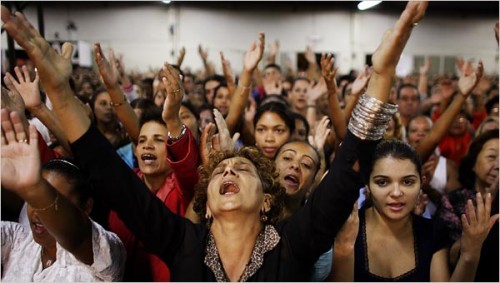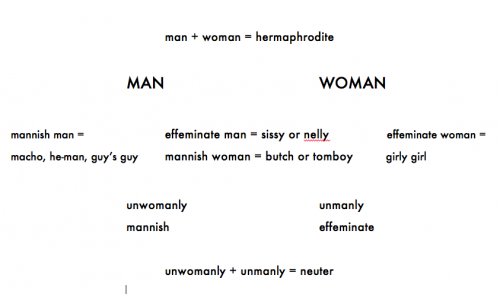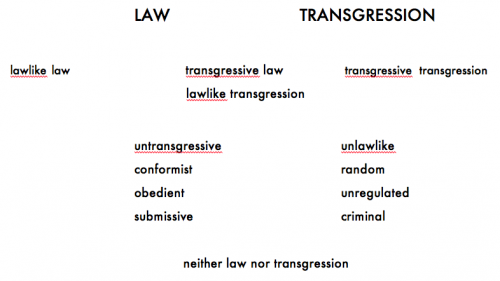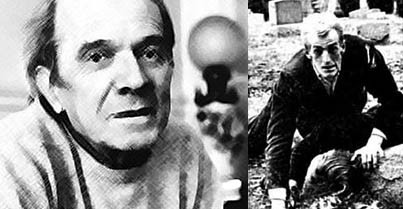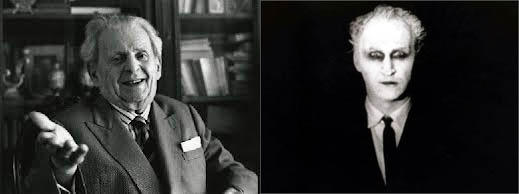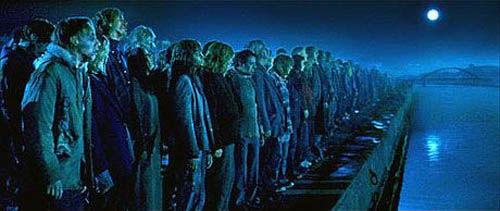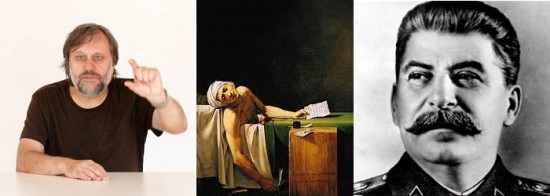THREE ESSAYS ON Žižek
•3. Žižek’s STALLING
We would do well to remind ourselves of how the Greimas square works, because knowing the square is going to make it easier to pick out what is least settled in Žižek’s thinking: his uncertainties, his panic. Before you click away to some corner of the Internet that doesn’t involve Lithuanian semiotics, let me observe that there is nothing metaphysical about the Greimas square. It’s just a device for beginning to say in which specific ways a given opposition is likely to turn unstable—which particular terms, in other words, an antithesis will generate but no longer be able fully to encompass. It provides a rough guide to the instability of any conceptual pair you find yourself needing to think about. Perhaps you’re trying to make sense of a story (or a philosophical system or the everyday idiom of a school or social scene), and you’ve noticed that it is fixated upon some opposition. If you now tabulate a Greimas square around the opposition’s two terms, you will have a much clearer idea of how X vs. Y can become unstuck, at which point you can turn back to the narrative (or whatever) and start scanning it for its pressure points. You will have a better chance of naming the passages (or episodes or characters or arguments) that most threaten the narrative’s governing antithesis. The Greimas square will flush out the material that the story has to work hardest to contain.
Here’s the easiest possible example. We compulsively code people and animals according to their genitalia, to the point where some people think that the doors of restaurant bathrooms are the very model and derivation of all two-term thinking. So the Greimas square begins with what first strikes the mind as a fixed opposition:
Next comes the bit that has the character of an instruction. For each term x, you think up some adjectives that describe the un-x and then record them in a short list beneath x’s opposite number, like so:
All of the action happens now, once you have these four corners in place, as you begin to sum each of the vectors in the square, vertically, horizontally, and diagonally: Man plus woman, man plus mannish, man plus effeminate, and so on. If we accelerate to the completed square, it will look like this:
We’ll want to note at least three things about this and any other such quadrangle. 1) Its line of central terms, from “hermaphrodite” down through “tomboy,” all name intermediate or mongrel concepts: mules, tangelos, the usual stuff of the dialectic. The Greimas square is an especially efficient way of generating, from out of a system in seeming repose, its agitation—its misfits and unassimilated conceptual grit—though it will at the same time disclose the categories by which the system will move in to denominate its own anomalies. 2) When you sum each side of the square vertically (man + mannish, for instance), the adjectives that reside on the bottom tier will serve as intensifiers, producing purified or pumped-up versions of each of the antithesis’s central poles. Implicit in the Greimas square is thus the neglected insight that positive terms—terms that seem to exist outside of relationship—are as disruptive to a binary order as intermediate ones. 3) Aficionados of Greimas often call the hermaphrodite—the both-and construction that perches on the top of the completed square—the perfected or utopian term. It’s not clear whether we should call this synthesis queer (because its archetype is the androgyne) or un-queer (because its original is marriage). Either way, it is in this utopian term that the system’s initial opposition is overcome, its stalled conflicts and predictable oscillations set to one side, and the gratifying possibility of new historical and narrative material at last glimpsed. The x-plus-y term is usually thought of as the way out of a given semiotic square and into some other parallelogram or lozenge.
Knowing even this much about Greimas should allow us to say what makes Žižek’s project in many respects rather unusual. His thinking is manifestly organized around an opposition—the antithesis of law and transgression. That couplet will reappear in scores of his more local arguments. But what he calls upon us to repudiate, after those many arguments have crystallized out into their overriding political claim and program, is the merger of law and transgression in post-Oedipal capitalism’s culture of compulsory mischief, that historically novel system in which authority accrues to the rule-breaker rather than to the bailiff and in which it has become possible—check your own head—to feel guilty about doing what you’re told or to find the superego calling you to account for being insufficiently insubordinate. We can simplify that last sentence: Žižek repudiates the merger, and this is peculiar because it means that on the schedule of concepts generated squarewise by the antithesis law vs. transgression, it is the perfected term—the fusing of obedience and rebellion—that Left Lacanianism recommends we back away from. Žižek is widely regarded as a dialectical thinker, but it has to be said: He takes the synthesis to be the problem, and that isn’t how the dialectic typically works. Žižek means to identify an already existing fusion and then in some not entirely perspicuous sense resolve it back into its component parts, to throw the dialectic in reverse or desublate an established Aufhebung. Anyone running a Greimas square on The Plague of Fantasies or The Ticklish Subject is going to stop short upon finding the utopian term preemptively blocked, displaced by market society’s malign parody of reconciliation. We’ll still want to work up the square, though, because doing so will at least generate the other options, the terms that might be asked to serve as utopia now that synthesis has forfeited the role. Some other location on the square is going to have to provide the chute that leads out of its geometry, and we’ll want to know which it is.
So here is what Žižek’s square would look like if we left all its terms in the abstract:
At this point, our task is to work out what more specific terms Žižek has inserted into each of these conceptually dictated slots. We need, that is, to determine what kinds of historical substance can be attributed to the square’s otherwise intangible positions. We already know that the perfected term has been captured by the new spirit of capitalism and its “world of ordained transgression.” Change fast … match your brand’s look and feel … constantly innovating … 5 billion emails every month … monitor activity … celebrate creativity and chaos. And any disaffection we feel towards this term can effortlessly be extended to the two just below it, those other, equally inauspicious mediations: lawlike transgressions, the Lacanian name for which is hysteria, and transgressive knuckling to the law, known locally as perversion.
So with the central spindle removed from consideration, a Lacanian politics is going to have to travel the Greimas square’s outer perimeter. Three possibilities end up suggesting themselves:
Three o’clock
-Perhaps what we’re looking for is a politics that, in Žižek’s words, “suspends the dimension of the Law” or that affords us “jouissance outside the Law”—a transgressive transgression, then, a mode of waywardness that makes no reference back to the decrees of God or government and so can no longer be called “transgression” or “misconduct” nor even properly “lawlessness.” Žižek’s name for such devilry is “Christianity,” which is going to seem less confusing if we quickly note four things:
1) The philosopher from Catholic Europe doesn’t seem to realize it, but he isn’t talking about Christianity in general so much as about its hyper-Pauline strains—about radical Protestantism, in other words, and especially about the sects that came to the fore around the English Revolution: the Independents, the early Baptists, the Muggletonians. Something about Žižek’s confessional turn would have been more comprehensible if he had subtitled his books “Why the Quaker Legacy Is Worth Fighting For” and “The Perverse Core of Quakerdom.” If his persistent Jesus talk has struck many readers as confusing, this is at least in part because the Christians he is talking about are either dead or living in Pennsylvania college towns. Chances are you haven’t met them.
2) These Christians really did declare an end to the law. Here’s John Milton in Paradise Lost: “And to the cross he”—Jesus—“nails thy enemies: the law that is against thee and the sins of all mankind.” Knowing the historical case is your best chance at guessing the kind of politics that Žižek is trying to resuscitate when he says, in Miltonic accents, that Christ “signals the Law’s demise.” In the seventeenth century, some radical Protestants began selecting their own ministers from out of the nation’s pool of university graduates. They wouldn’t accept appointments from a superimposed hierarchy, but expected, rather, to exercise oversight over their own guardians. Others began raising ministers from out of their own plebian ranks—lay preachers, then, who kept their day jobs and were granted no special authority over their parishioners. In Bristol, England, there were mixed-raced Baptist congregations presided over by women as early as 1650. And then others still took the next consequent step and abolished the position of minister altogether, a feat that once perfected within the church could next be repeated extra-ecclesiastically. Milton held high office for its duration in the revolutionary government that beheaded the English king in 1649, which act is what the poet had in mind when he imagined the law being executed in Jesus’ stead, with Christ back on the ground and hammering, a centurion turned against the empire, the crucifix mutating before the reader into Judea’s guillotine.
3) This Christianity depends on a simple shift in grammatical mood. Where most churchgoers will tell you that Christians should love other people, the believers-beyond-the-law will say instead that Christians do love other people. If you are the sort of person who takes care of others without asking for their papers or checking first to see if they are worth your attention, then you are a Christian; and if not, then not. If, that is, you have to think about any of this, if you have to deliberate your way to that position, then you are only revealing your distance from God. There is thus an anti-ethical moment within Christianity itself, for which solidarity is not an obligation, but a kind of moral fact—the most important thing, in one sense, but also just something that people do. Keeping the law would, from this perspective, be a problem, since once you tell yourself that you should be more loving, you have made it clear that you would actually rather be some other way—you would prefer to be unreceptive or perfunctory or bilious—at which point agape can become just another target for your resentment, one more stricture that your authenticity requires you to defy.
4) In Book 8 of Paradise Lost, after the archangel Raphael has finished telling Adam the story of the Creation and the war in heaven and the ostracism of the rebel angels, he pauses to ask if the first man has any questions. And Adam has only a single question—just one thing he wants to ask: Do angels have sex? Raphael replies that they do, except that spirits have no flesh, such that they are constantly passing in and out of each other organisms, “obstacle finding none of membrane,” wafted into penetration by each puffing breeze. What Milton brings into view, then, is the possibility of a sex uncarcassed, whole-bodied and resolutely non-genital, still the literary canon’s most compelling image of polymorphous desire, a libido without need of fruitfulness or groin-anchoring. We will read elsewhere in the poem that the angels are “without feminine”—they are all “masculine”—and this will only confirm the point: that the radical Protestant heaven is a place of unrestrained sex between men, or if not men than males, gay sex, you might want to say, except that this sex accords no priority to “joint or limb”—some other gay sex, therefore, the hypothetically unphallic version, gay male sex refashioned on the example of its lesbian feminist antithesis. This is Christianity’s own vision of liberated enjoyment or good obscenity—of pleasure beyond the law—all of it palpable still, if you seek out the right Sunday service, in the quaking and the shaking and the shout music. The overall point is simple: Žižek sometimes seems to think that Jesus is how you become a Lacanian without going into therapy, and he thinks this because there really have existed Christians who believed that the law had been abolished and that moral life was a matter of enjoyment rather than obligation.
Six o’clock
-But then you might decide that pursuing an ethical enjoyment doesn’t make any sense. Let’s first put the best face on that position: The doctrine of good obscenity holds that political goods are not sustainable if they are rooted in repression. If, for instance, my fellows and I achieve our solidarity only by discretion and euphemism, then our camaraderie can at any point be blown apart by an eruption of the Real. The alternative would be to absorb trauma and the drive into our position and so to seek gonzo versions of what we’ll have to stop calling values: not freedom, but nasty freedom; not equality, but nasty equality; not justice, but nasty justice. Liberté, égalité, obscénité. But this proposal is hard to carry through consequently. Part of the problem is as it were philological. Another of Lacanianism’s core arguments is that the father is always a sham. That’s the starting point, in fact, from which psychoanalysis leads most directly to an emancipatory politics; it thinks it can show you that paternal authority doesn’t really exist. You probably formed your conception of authority at age two or three, attributing to your father powers that he plainly did not possess. To a toddler, the father is, ludicrously, the Person Who Can Do Anything He Wants—the one who can run faster than you and jump higher and always reach the ice cream, the one who can pull your nose from your face and reattach it at will, the one who can send you to your room and somehow make you stay there. Žižek’s claim is that your relationship to authority has never stopped being childish in this fashion, that even once you grew taller than your dad and began to outrun him and realized that the nose in the old man’s fist was just his own poorly disguised thumb, you transferred your belief in his omnipotence to the father’s sundry proxies: cops, bosses, priests, &c. What remains as one of childhood’s more damaging legacies is your conviction that there exists somewhere someone who gets to do all the things that you are prevented from doing, someone who possesses the jam that you lack. The grown-up alternative to this view would be, rather than struggling against such people, to stop believing in them, to stop conferring on them a supremacy that they would not have absent your belief. So authority in some sense doesn’t exist but is merely an attribution; all pretended powers are to that extent spurious; and the word “obscene,” in Žižek’s writing, usually refers to the way in which your desire is entwined with such fantasized and illegitimate hierarchy. But when Žižek writes, as he often does, that what we require is, say, an “obscene solidarity,” he can’t mean the word in that sense. He can’t mean a solidarity supercharged by some delusion we hold about our fathers, since the paternal presence, even if a phantom, would so obviously compromise the solidarity it is being asked to underwrite. Worse: We require an obscene politics on simple Enlightenment grounds, so that our practices will not depend on repression and its fragile lies, but then obscenity threatens to reintroduce into those practices distortion and misapprehension at another level. We watch Pentecostals chicken-walk down a church aisle, and we can just about imagine an obscene justice, except that obscenity in the sense that Žižek usually means it would transplant injustice back into the realm of the fair and the due. How, we will need to know, could obscenity serve justice and still be experienced as obscene? Wouldn’t obscenity by definition bring with it excess, inhumanity, compulsion, &c?
Nor is the problem merely lexical. That Žižek continues to use the word “obscene” in these contexts should rankle; it is a persistent if accidental reminder that transgression carries law with it and that devising genuinely liberated versions of the Left’s core positions is going to take more than an act of will. So the next part of the problem is epistemological: Let’s suppose I’m white and I’m close to some guys who aren’t, and I say that, no, really, I can joke with them about how enormous their penises are, because I am thereby acknowledging the history of racist cliché, the sexual panic that was woven into every looped rope, &c. This will be the crucible of our confrerie; my tastelessness will retrieve entire registers of historical experience that tact would just as soon place beyond discussion. And yet it is reasonable to ask: How will my buddies know what construction to put on my jokes? Psychoanalysis hardly suggests that we are transparent to one another, so I shouldn’t, if I’m following Žižek, be able to take my intelligibility as given. How, in other words, would anyone who is not himself a trained Lacanian analyst be able to tell that my joke isn’t a way of pulling racial rank on them? And wouldn’t even my analyst require long acquaintance with me in order to make that determination? So why would any comrade of mine put up with those big-black-dick jokes for the time it took to figure this out? Or maybe I think that my crew should be able to know my mind immediately and on the spot. Maybe there are simple verbal indices that will tell a person what is liberated enjoyment and what is mere hysteria. But then what would those be? Psychoanalysis doesn’t give us any reason to hope that this would be the case, and Žižek never instructs us on how to make the call, and besides, if there were such rhetorical cues—features of syntax or word-choice or inflection—then these would be mimickable by any racist and they would thereby stop functioning as cues. So let’s agree that my friends can’t tell my mind. But then I have to wonder, too, whether I can really know that my wisecracks are emancipated and anti-racist rather than obscene. Can I be sure that I understand my speech any better than others do? When did Freudians start believing that people are in control of their own utterances? At this point the epistemological problem reveals itself to have been a properly analytic one all along. For even if I speak my jokes in the spirit of uninhibited fellowship, can I be sure that I’m not also deriving pleasure, repetitively and compulsively, from them? It is a rare joke that tells itself only once.
One way to terminate this train of misgiving would be to give up on the idea of a good obscenity or enjoyment outside the law. Perhaps rather than trying to wrest pleasure free from regulation, we could cancel the law and enjoyment in one, swinging from the Greimas square’s scatty right flank down to its neutered fundament. The neither-nor would replace the both-and as the dialectic’s utopian term, producing not a synthesis but merely an uncharged field, atheticized and disannulled—an antinomianism still, but one that gains the unlawed person no treats or hedonic bonuses, an antinomianism chaste and meager. Perhaps, Žižek writes, we should worry less about “suspending the explicit laws” and worry more about suspending “their implicit spectral obscene supplement.” A good politics wouldn’t produce a different obscenity; it would “simply have none.” The complication that emerges at this point is that Žižek’s name for this position, as rival to an ecstatic Christianity, is also Christianity, which is thereby made to occupy two competing slots on the Greimas square. Maybe Christianity is the religion of love-not-law, featuring a god who pals around with whores and compulsively turns all nonalcoholic liquids into wine. But then maybe radical Protestantism’s love-beyond-the-law will itself no longer feel much like love. The Quakers, after all, haven’t quaked for centuries. They sit in silence in spare rooms and address each other as “friends”—Lenten intimates and un-obscene compeers, forming a horizon of flat amity from which no-one rises to the level of lover.
Nine o’clock
-But then if the idea is now to cancel the obscene supplement, it is enough to consult the Greimas square to know that one further option remains conceptually available. This would be the square’s left extremity: the law that is fully law, law in its positivity, with no furtive link back to disobedience—a position that, though thinkable, is psychoanalytically disallowed, which makes it all the more surprising that Žižek has been willing both to entertain the option as a political goal and to propose a candidate as historical bearer of the project. Here’s the project: “The problem (today, even) is not how we are to supplement Law with true love (the authentic social link), but, on the contrary, how we are to accomplish the Law by getting rid of the pathological stain of love.” “Kant sans Sade,” he sometimes calls this idea, a figure we normally know as “Kant.” And here’s the bearer: “Jews assert the Law without superego.” The origins of Judaism lay in a “liberation from the obscene superego.” Israelite hyper-legalism—the stance of a cartoon Judaism that sticks myopically to the letter of the law while ignoring its spirit—brings into view the law in its pure form, without “the repressed desire to sin.” And with that we have the answer to the acrostic’s last unsolved clue. Once we speak the word “Judaism,” we can re-do Žižek’s square with all its proper names and historical specifications:
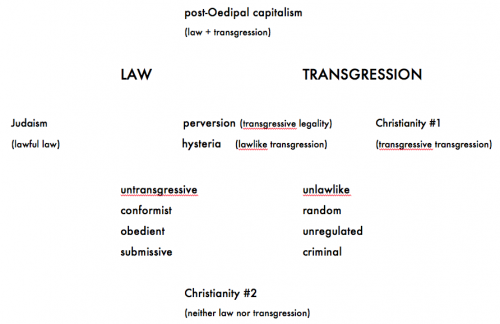
This schema allows us to see, among other things, that Žižek’s turn to political theology hasn’t, in fact, been all that pious. He has been interested in Christianity and Judaism only because their various sects really have had rather different things to say about a person’s proper relationship to the law and so can, at the price of a certain brusqueness, be asked to stand in for the combinatory’s several positions. But anyone put off by his readings in the history of religion can at any point return to the square in its conceptual purity and ahistorical abstraction; there’s no reason you can’t put forward your own secular version of the square, provided you are willing to propose alternate, irreligious candidates to take the place of Žižek’s godly ones. One word of caution: The most difficult moment in that undertaking is always going to involve the slot that Žižek calls “Jewish,” which has to be occupied by a magical people without drive or libido, utopian Pharisees and virtuosi of repression, the ones who can ignore their desires and never pay the price.
An opportunity now arises: With the completed square in front of us, we can say at last where Žižek’s thinking is most stuck. The square’s simplicity strips away the endless ingenuity of Žižek’s page-long riffs and discloses instead the unsteadiness of his Lacanian structure—the problems it cannot solve and questions it cannot answer. What almost no-one has noticed, for one, is that Žižek has been distancing himself from Christianity over the past decade and shifting over instead to the positions that he calls Jewish. Granted: They’re probably only Jewish within his Lutheran and sock-puppety scheme. The way he uses “Judaism” as a shorthand for various law-loving positions might, indeed, irritate you, but before your annoyance propels you to stop reading, you might want to at least register that this Judaism, if a scarecrow, is a scarecrow that Žižek has begun to identify with. Here, reduced to their tags, are some of the positions he has been arguing of late: that we have to “assert the priority of the Jewish principle of just revenge/punishment”; that we must mount a defense of “rigorous Jewish justice”; that we must retrieve “the most precious and revolutionary aspect of the Jewish legacy”; that we must forgo the banalities of human rights talk for the non-negotiable severities of the Decalogue; and, again and again, that “we are all potentially homo sacer,” which, traced back to its source in Agamben, means “We are all potentially victims of the camps” and is thus an erudite, Romanizing update of an old radical street chant: “Nous sommes tous des Juifs allemands.” You might remember reading in the Book of Acts that the early Christians were communists—“all things were common property to them”; “no one claimed that any of their possessions was their own”—and guessed on those grounds that Žižek’s drift to Leninist militancy was the simple extension of the month he spent reading Paul in the late ‘90s. Rhetorically, though, Žižek’s neo-Bolshevism is better understood as a break with his Protestantism, which turns out to have been cranky and fleeting, like those three Dylan albums that no-one ever listens to, though Zizek has never really announced his conversion, and it will take some cross-referencing to establish the point: In one book we read that ancient Judaism was “revolutionary” because it was willing to treat the law as a “pronouncement,” “something externally and violently imposed.” In another we read that the Left must “assume the task of a new ‘ordering’ against the global capitalist disorder”; capitalism is a non-regime of “permanent self-revolutionizing” and pointless innovation, against which we must “shamelessly enforce” a new law. Our communism will, in this sense, come from Sinai and not Galilee. Under the sign of Moses, revolution and counter-revolution become impossible to tell apart.
This particular argument of Žižek’s might, at first, seem a little startling, if only because it has rarely been appreciated how much of his corpus amounts to an ongoing Réflexion sur la question juive. But what is truly confounding is not this or that particular proposal of Žižek’s—not this or any other recommendation as to how we might best tackle the problem of enjoyment—but the sheer number of such recommendations. Žižek has lots of ideas about how we might get enjoyment right, and the effect of this fertile, brainstorming array of possibilities is to rob each individual suggestion of its plausibility and so to make the problem seem insoluble after all. False motion is the sign of the system’s stalling, its unremitting reasking of a question the possible answers to which never seem to stick. Žižek is hardly immune from the kettle logic he is quick to spot in others: —I didn’t break your law. –The law was broken when you gave it to me. –Law? What law? God doesn’t make laws. Pauline Christianity is likely to believe that Jesus “paid the price” or “fulfilled the law,” that he enabled God to show us mercy by suffering in our place, &c. It is in this sense entirely nomian and law-loving, suggesting as it does that it was beyond God’s power simply to repeal the law or to declare it void. Even a radical Protestantism thus preserves something of the law’s structure secreted inside itself, on the theory that Christ’s death keeps in permanent balance the scales of divine justice. Against this a more thorough-going antinomianism can argue that Jesus’ death was so brutal that there is nothing you and your piety can do to make it right again. You cannot say: Oh, I get it—this man was tortured and hung up to die, and I therefore promise not to have sex until I get married. That idea is, in fact, a little nutty, as though your prolonged virginity were in some sense equivalent to torture, as though the one could compensate for another. The best thing about Christianity is that it has at its center an act that was entirely cruel, because cruelty breaks the logic of the quid pro quo, which is the logic of the law or the contract or the bargain. But this notion of grace—which is the doctrine of the law’s gratuitousness and self-indicting excess—imposes the burden of endless thanksgiving, the acknowledgment day after day of an unpaid debt, which is to say a peonage: “Then for thy passion—I will do for that—Alas, my God, I know not what.” Calvinism, meanwhile, manages to suspend the law only by positing a sovereign god, a lord and father, whose authority cannot be checked even by his own commands; there is no law, it’s true, but only because God doesn’t have to honor any of the agreements you think you’ve made with Him. A Christian antinomianism, judged within a Lacanian frame, keeps cycling back to law and superego and Big Daddy. Žižek’s point all along has been that the concept of law doesn’t exhaust how the social order keeps a hold on us—that there is always something beyond law—and that this other thing, Enjoyment, necessarily approaches us as non-juridical beings, hence in the mode of bare life. Antinomianism might be the path to emancipation, but it is also the condition of both the sovereign and the homo sacer, those persons outside the law. So Žižek has gotten more hostile to Enjoyment over time. His asceticism has taken over. He has come to think of Judaism as a spiritual practice that can teach us how to follow the law without getting sucked into the obscene supplement. And he thinks the same thing about Kant—that Kant teaches us how to work upon ourselves, in a Lacanian spirit, so that we can identify moral law without Enjoyment getting in the way. And he thinks that Leninism was a Judeo-Kantian politics, before Stalinism took over and brought obscene enjoyment back into Communism. But there is still a very big problem. When he is attacking the theory of radical democracy put forth by some rival Lacanians, Žižek says that these others just don’t get it—that the negativity at the heart of democracy generates its own obscene supplement. Democracy prides itself on being ideologically thin, which means conceptually and libidinally thin, minimally mystified. A proper democracy will be entirely procedural or formal; it won’t tell anybody what to think or feel or want. But this means that democracy cedes enjoyment, the libido, &c to the Right, to which it is then attached in a historically determinate structure: an erotically thin democracy will always go hand in hand with erotically charged challenges from the Right. You can say in advance that they have to go together; you can’t have the first without the second. That’s what he means when he says that the last generation’s new nationalisms and new fundamentalisms have been part and parcel of democracy and the center-Left: Obscene enjoyment “is the obverse, the fantasmatic supplement, of democracy itself.” It is on this point that Zizek is, in fact, closest to Wilhelm Reich. But then one has to wonder: How is his notion of a Judaic communism of the Law exempt from this same critique? What happens to Enjoyment under Judaism or Kantianism or Leninism? We’re really back to basics. Psychoanalysis tells us that the libido never just goes away; you can’t tell it to leave and you can’t tell it to heel. So why would Jews and Communists be exempt from this? Why would they and they alone have beaten Donkey Kong? If consumer capitalism is the Regime of Obscene Enjoyment that a justice-loving Communism is offering to repress, then won’t capitalism just take on the status of the Real or the drive, especially for the many of us who will possess pre-revolutionary memories of such a thing—won’t a successfully suppressed capitalism just become the market unconscious, the consumer underground, the shop-till-you-drop-and-all-you-can-eat-and-our-doors-never-close? So here are my two questions for Žižek, which I’m hoping someone will put to him the next time he is near a mike: First, are we meant to pursue a politics beyond obscenity or is the idea to make obscenity itself do the work of justice, and if the latter, in what sense would this obscenity still be obscene? Second, and perhaps more pressingly: How do Jews get their kicks? I know, I know: That question lies at the center of Žižek’s entire conked-out system, and it still sounds like a joke.
(My thanks to Jason Josephson, Anita Sokolsky, Ali Mctar, and my fellow readers of Zizek in ENGL 456.)

